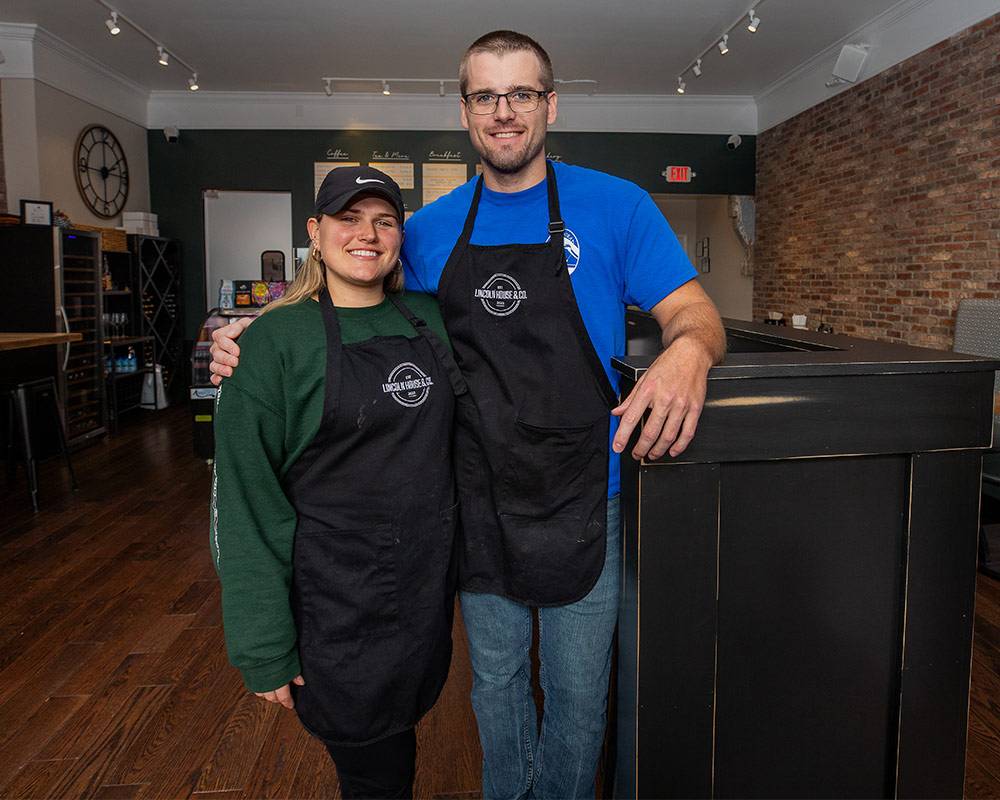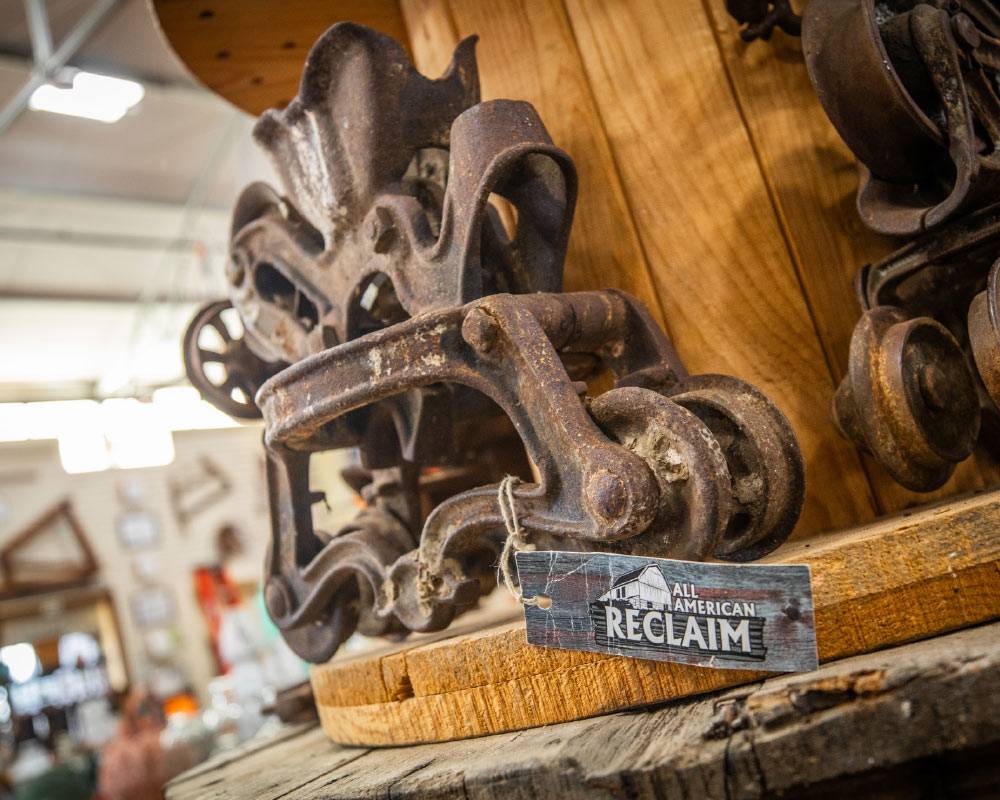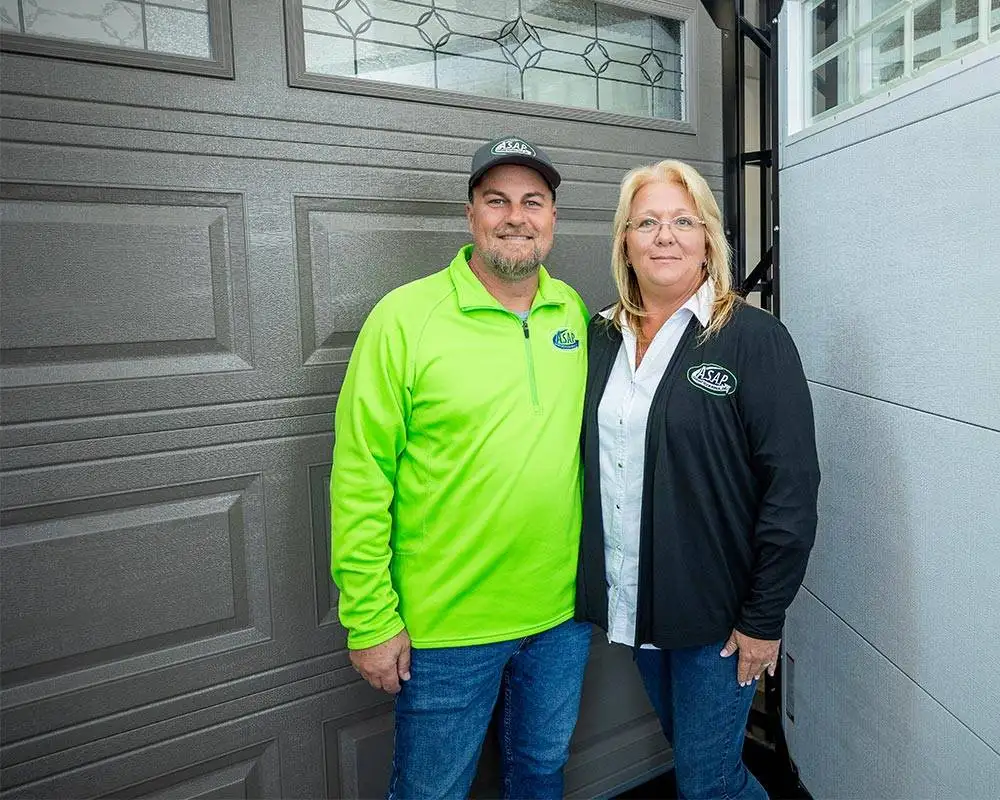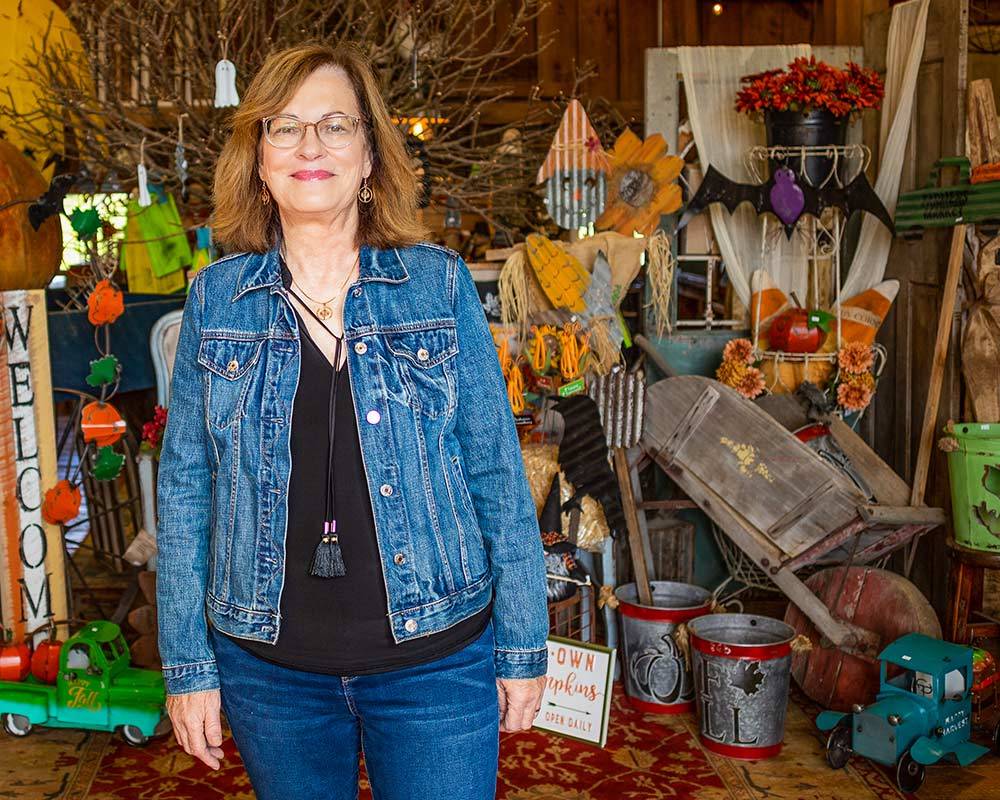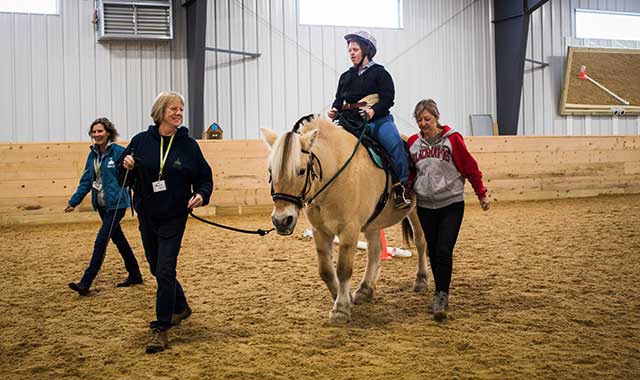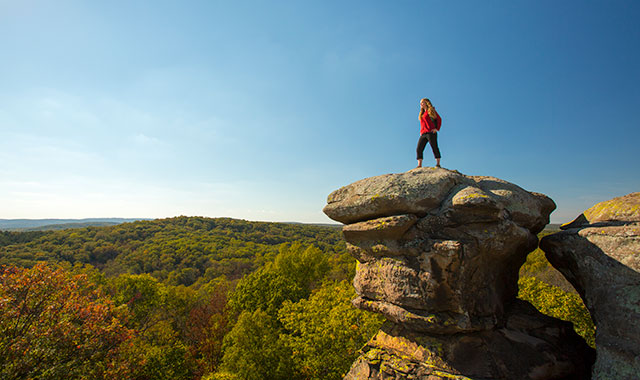It’s no small thing when these horse lovers say they have a way of changing lives through animal-assisted therapies. Indeed, a wide variety of clients have achieved personal empowerment while working with this Richmond-area farm’s lovable critters.

The teen thought frequently about ending her life and knew precisely how she wanted to do it. She believed she had nothing to live for.
A goat taught her otherwise.
Like the other teens in her group, this one was surrounded by the little herd of rescued farm animals at Main Stay Therapeutic Farm, 6919 Keystone Road, in Richmond. Where the other kids were laughing and petting the animals, this fragile teen wanted nothing to do with the experience.
But animals have a way of showing their feelings and recognizing our true emotions. The teen was surprised when a goat snuck up and rubbed his nose on her shoulder. She shooed him away. The goat returned, again rubbed his nose on her shoulder and was shooed away.
“Eventually, she allowed the goat to lean against her, and she and the goat became friends,” recalls Shawna Egan, a part-time corporate and community relations director at Main Stay. “The next session, this group came back and they were talking about their expectations for the day. Was there something you’d like to see? This girl says, ‘Is that stupid goat going to be there?’”
Little by little, the teenager started warming up – to the little herd, to the volunteer guides, to the rest of her group.
“At the end of this group’s time here, this girl revealed how life-changing this experience had been for her,” says Egan.
“Life-changing” is a description Egan hears a lot around the farm – probably because this place is in the business of impacting lives. With a mission to help people become successful in whatever areas of life they have a challenge, Main Stay provides a diverse range of services to a wide group of people – old and young, those with physical or mental challenges, those with emotional and behavioral issues, those with dementia, for example.
At this unique farm, therapeutic horse-related and animal-assisted learning are simply a way of encouraging someone to reach their greatest potential.
“When people walk through the door, we don’t see a label,” says Egan. “We see individuals walk through the door, and we accept them where they are. Even with some of our hardest kids – ones who’ve had a lot of difficulties in life – we don’t have security at the door. We have no expectation of you, other than you’re going to do your best.”
Therapy in Many Forms
Today, a group of teens from a special education program at McHenry’s high schools are touring the barn with Carla Kaizen, a program and education specialist. These youths are part of a life transitions program that’s preparing them for successful careers. Today they’re learning about wellness.
Their first stop is the horse stables, where they’re meeting with barn assistant Jessica. She’s just taken in Luigi, a bunny recently retired from Main Stay who was diagnosed with diabetes. The students are eager to hear how he’s doing.
“Is he liking having no sugar in his diet?” asks one teacher.
“Blueberries are his favorite, and he hasn’t had them since he got sick,” explains Jessica. “But it’s getting better because we’re discovering new types of healthy, leafy greens. He gets spinach and kale now, and he likes bok choy.”
Therapy at Main Stay takes many forms, each activity aimed at the unique needs of a specific group or individual.
The big attraction is the horse riding arena, where clients can exercise their physical, developmental, cognitive or emotional needs by riding a horse. Some riders are led around the arena, on horseback, with help from a trained volunteer leader. Those who need more physical support might have a leader with volunteers walking on either side of the horse.
Over in the tack room, riding instructors have left detailed notes matching up each horse with a client and the requisite equipment. Such “tack” can vary based on the horse’s size and the physical needs of the rider.

Main Stay has a wide variety of horses that can meet the varying needs of clients – tall horses, shorter horses, wider horses and thinner horses, says Egan. Equipment is chosen not only to fit the horse but the rider’s specific needs.
Not all clients ride a horse, but they can still interact with the farm’s 12 horses in the grooming area, near the tack room. Built extra-wide, these stalls can accommodate both horse and wheelchair.
“We can do a ton of therapeutic activities here,” says Egan. “We can brush the horse, clean their hooves – and all of that is normal activity of caring for the horse, so there’s a lot of bonding that can occur between human and animal.”
Outside, the little herd meanders about the pasture. A few sheep, some goats, a donkey and some miniature ponies wait for the next group to appear. A few cats and the occasional wild turkey make an appearance.
It makes for amusement and a good challenge when the animals participate in games like “lava pit.” An instructor throws hula hoops and colorful plastic piping on the ground to create safe “islands” that must be crossed. The challenge is for the client to lead an animal around these island pathways without stepping in the “hot lava” on the other side.
“So, how are you going to get these animals through the islands?” says Egan. “Are you pulling them? Are you pushing them? What type of leader are you? Are you aggressive? You can learn a lot about yourself.”
Raised garden beds in the adaptive garden hold fruits and vegetables waiting to be harvested. This, too, becomes an activity for learning and growth.
“We have kids and teens coming from the city, some of whom have never seen a tomato grow,” says Egan. “They have no idea where it comes from, except for the grocery store. At Main Stay, they get to see it grow from a seedling to a plant with tomatoes on it. They’ll watch it go from green to red and they’ll harvest it. Then, we’ll have classes where they make salsa or healthy treats for themselves and the animals. From beginning to end, they can see the full life cycle process.”
Back in the barn, Jessica is telling the McHenry students about the many rescue and foster animals she has at home – birds, dogs, a blind cat, a hibernating squirrel – and sharing how Luigi the bunny is fitting right in. He’s made friends with a maladjusted bird and has taken to nibbling food scraps in the kitchen.
“If you were responsible for choosing a good home for Luigi to retire to, is this a good home?” asks Kaizen, the Main Stay instructor. “Thumbs up is awesome, thumbs sideways is meh, and thumbs down is ‘No way, they can’t take care of that bunny there.’ Let’s see your thumbs.”
The teachers repeat the question and the students show their thumbs. One girl doesn’t respond. The teacher asks: Do you understand the question? The teen looks confused.
“Do you think Miss Jessica’s house, that she just described, would be a good place for Luigi?” the teacher asks.
The student smiles and her thumb reaches toward the sky.
Living the Mission
Main Stay Therapeutic Farm was formed in 1987 when lifelong equestrian Sara Foszcz and physical therapist Sandy Barcus sought to serve children with physical disabilities through therapeutic horseback riding. From five clients that first year to more than 70 riders and another 20 to 25 who participate in animal-assisted therapy, Main Stay has tapped a growing base of not just clients, but active volunteers.
Located on a pastoral hilltop near Richmond, Main Stay provides a rural retreat for the urban agencies and schools that visit from places including McHenry, Kane, Cook and Lake counties in Illinois as well as Walworth, Kenosha and Racine counties in Wisconsin.
Main Stay overlooks the far western side of the expansive Glacial Park conservation area. It’s quiet among these dramatic hills, and the peacefulness permeates the farm’s impressive new barn, opened in summer 2016. Built with sustainability practices in mind, the barn includes geothermal heating and eco-conscious building materials.
It’s a welcomed complement to the original facility: a white former dairy barn next door.
“There were seven or eight staff members sharing one workspace, and we could couldn’t ride if there were extreme temperatures,” says Egan. “The new facility’s heating and cooling systems allow for year-round programming.”
Features around the building are also a testament to the driving force of volunteers. The spacious new horse stalls were a gift from two dedicated volunteers who stained the wood and erected the structures. Two other volunteers created the horseshoe brackets for holding equipment.
Nearly 125 volunteers pitch in during any given week. Many have experience with horses – but not all do. Help is needed in myriad ways, from supporting horseback riders to regular maintenance duties and farm chores. In 2015, volunteers logged more than 10,500 service hours at Main Stay.
“We thank them for their work and they say, ‘No, thank you. You have no idea what this did for me. I was in a rut, and just to see some of these folks who have limited movement or impaired cognitive skills – they’re so happy to be here,’” says Egan. “There’s a huge connection between the animals and individuals. Our volunteers walk in here and they’re ready to go. It’s really cool.”
Those volunteers help to take Main Stay the extra mile.
“Everything we do is individualized,” Egan says. “So, it’s not like this group’s coming in and everyone gets 10 minutes on the horse. It’s providing exactly what this person needs.”
Main Stay’s tiny staff is largely comprised of part-time employees whose work supplements the rest of the staff. The small office team allows Main Stay to focus its resources on therapy and allows donors to put their money into direct action. Donors can sponsor particular animals, purchase needed materials or contribute general financial resources, says Egan. The facility is also available for group rentals such as team building activities and off-site meetings.
Changing Lives
The life-changing work at Main Stay is personal for Egan. Her daughter, Abby, has received services here for two decades. She was diagnosed as a child with Rett Syndrome, a degenerative neurological disease that, among other things, causes loss of normal movement and coordination. It also affects her ability to walk.
But when she rides Kay the horse, Abby is strengthening the muscles she needs for walking.
“On the horse, you’ve got to use your muscles to sit up straight,” says Egan. “You’ve got to squeeze your legs against the side of the horse and sit upright using your stomach, back and core muscles; your hands hold the reins. So, all of those muscles that would otherwise deteriorate are getting strengthened with every lesson. Her doctors believe that therapeutic riding is one of the biggest reasons why Abby is still able to walk.
It’s also plenty of fun.
“On the way here, she’s just squealing with delight,” says Egan. “‘I want to go ride Kay.’ She’s all about it. By the time she’s done, she’s just exhausted, because it’s a lot of work. But you can see the transformation.”













